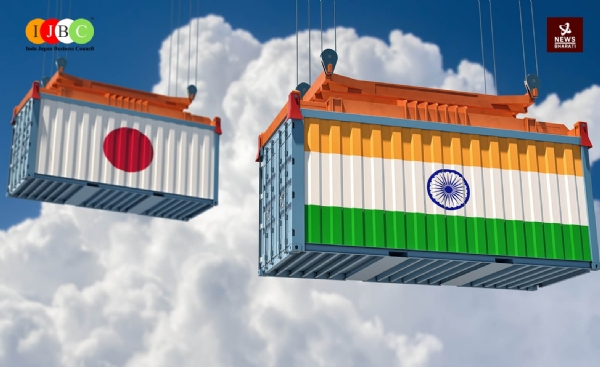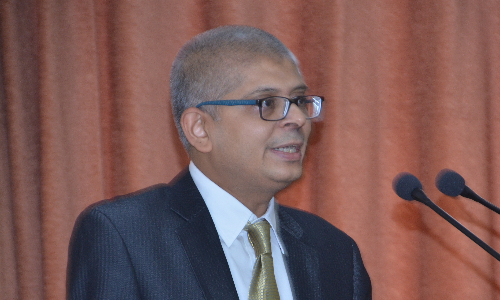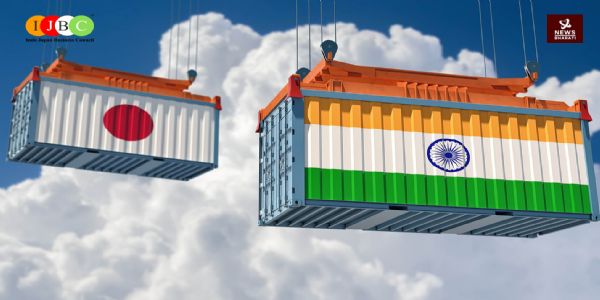India-Japan Bilateral Trade and Investment: Trends and Opportunities
Total Views | 294
India and Japan have developed a strong and mutually beneficial economic partnership over the years. The two countries have witnessed significant growth in bilateral trade, investments, and joint ventures, driven by their shared interests and strategic cooperation. In this article, we will explore the recent trends in India-Japan bilateral trade, highlight the investment opportunities available, and discuss the joint ventures that have emerged as a result of this partnership.

At the heart of the India-Japan economic relationship is the Comprehensive Economic Partnership Agreement (CEPA), which came into effect on August 1, 2011. This agreement covers various aspects of trade, including goods and services, intellectual property rights, investments, and customs procedures. By reducing tariffs and facilitating business activities, the CEPA has played a pivotal role in boosting bilateral trade between the two countries.
India and Japan have witnessed a steady growth in bilateral trade in recent years. In the financial year 2022-23, the total bilateral trade between the two countries reached a record high of US$21.96 billion. Japan's exports to India accounted for US$16.49 billion, while India's exports to Japan stood at US$5.46 billion.
India's imports from Japan have experienced significant growth, with a growth rate of nearly 160% over a 15-year period, reaching US$16.4 billion in the financial year 2022-23. Key imported items from Japan include nuclear reactors, electrical machinery, copper articles, plastic articles, and inorganic chemicals.
On the other hand, India's exports to Japan have also shown substantial growth, increasing by 58% over a 15-year period. In the financial year 2021-22, India's exports to Japan amounted to US$6.1 billion. The key export items include organic chemicals, nuclear reactors, machinery, mineral fuels, fish and other aquatic invertebrates, and precious stones.
Japan remains a significant investor in India, with substantial investments in key sectors such as automobiles, electrical appliances, infrastructure, and technology. In the financial year 2020-21, Japanese foreign direct investment (FDI) in India reached US$1.49 billion. As of June 2023, Japan was India's fifth-largest foreign investor.
The major sectors that have attracted Japanese FDI in India include electrical system design and manufacturing, general machinery, chemicals and pharmaceuticals, medical devices, financial services, construction, automobiles, and retail. Japanese companies such as Maruti Suzuki, Toyota Kirloskar Motors, Honda, Mitsubishi Group, Hitachi, and Sony have established a strong presence in India.
To further deepen economic collaboration, Japanese Prime Minister Fumio Kishida announced an ambitious investment target of US$37 billion (JP¥ 5 trillion) in India over the next five years during his official visit to India in March 2022. This demonstrates Japan's strong commitment to strengthening economic ties with India.
India and Japan have also formed several joint ventures and collaborations in various sectors, showcasing the depth and breadth of their economic partnership. One notable collaboration is in the field of semiconductor technology. In July 2023, India and Japan signed a memorandum of cooperation to collaborate in semiconductor design, manufacturing, research, talent development, and strengthening the chip supply chain. This collaboration aims to foster government-to-government and industry-to-industry cooperation, with the establishment of an implementation organization to facilitate these efforts.
Another area of collaboration is in the steel sector. India and Japan have focused on enhancing cooperation in the steel sector and addressing decarbonization challenges. Both countries recognize the importance of collaboration in achieving their respective net-zero carbon emission goals. Discussions have been scheduled under a 'Steel Dialogue' and other cooperation programs to prioritize the adoption of innovative technologies for energy efficiency and promote decarbonization in steel production.
Japan has made significant contributions to India's infrastructure projects under its overseas development assistance program. Japanese official development assistance (ODA) has been a major source of bilateral loan and grant assistance for India since 1958. The cumulative commitment of Japanese ODA to India stands at over US$48.98 billion.
The ODA provided by Japan has supported India's efforts in areas such as power, transportation, environmental projects, and basic human needs. The Japan International Cooperation Agency (JICA) has committed approximately US$2.24 billion to support various developmental initiatives in India's northeastern region. This assistance has been instrumental in accelerating India's economic development and strengthening the bilateral relationship between the two countries.
The economic partnership between India and Japan continues to grow and evolve, driven by shared interests, strategic cooperation, and investment opportunities. The CEPA has played a crucial role in boosting bilateral trade, and both countries are actively exploring new areas of collaboration such as semiconductor technology and steel sector decarbonization.
With the ambitious investment target of US$37 billion announced by Japanese Prime Minister Fumio Kishida, there are immense opportunities for further economic cooperation and joint ventures between India and Japan. The ongoing collaborations in sectors like semiconductor technology and steel highlight the commitment of both countries towards innovation and sustainable development.
As India and Japan deepen their economic ties, it is expected that the bilateral trade and investment between the two countries will continue to grow, bringing mutual benefits and contributing to regional and global economic stability. The India-Japan partnership serves as a shining example of how countries can forge strong economic relationships based on shared values, strategic interests, and mutual cooperation.
Indo-Japan Business Council (IJBC), established in 2011, is the apex bi-lateral Chamber synergizing India-Japan engagement in business, trade, commerce, education, and culture. IJBC is continually working to enhance India-Japan Business and Economic Engagement. Today IJBC has a pan India presence.

The Comprehensive Economic Partnership Agreement (CEPA)
At the heart of the India-Japan economic relationship is the Comprehensive Economic Partnership Agreement (CEPA), which came into effect on August 1, 2011. This agreement covers various aspects of trade, including goods and services, intellectual property rights, investments, and customs procedures. By reducing tariffs and facilitating business activities, the CEPA has played a pivotal role in boosting bilateral trade between the two countries.
Bilateral Trade Trends
India and Japan have witnessed a steady growth in bilateral trade in recent years. In the financial year 2022-23, the total bilateral trade between the two countries reached a record high of US$21.96 billion. Japan's exports to India accounted for US$16.49 billion, while India's exports to Japan stood at US$5.46 billion.
India's imports from Japan have experienced significant growth, with a growth rate of nearly 160% over a 15-year period, reaching US$16.4 billion in the financial year 2022-23. Key imported items from Japan include nuclear reactors, electrical machinery, copper articles, plastic articles, and inorganic chemicals.
On the other hand, India's exports to Japan have also shown substantial growth, increasing by 58% over a 15-year period. In the financial year 2021-22, India's exports to Japan amounted to US$6.1 billion. The key export items include organic chemicals, nuclear reactors, machinery, mineral fuels, fish and other aquatic invertebrates, and precious stones.
Investment Opportunities
Japan remains a significant investor in India, with substantial investments in key sectors such as automobiles, electrical appliances, infrastructure, and technology. In the financial year 2020-21, Japanese foreign direct investment (FDI) in India reached US$1.49 billion. As of June 2023, Japan was India's fifth-largest foreign investor.
The major sectors that have attracted Japanese FDI in India include electrical system design and manufacturing, general machinery, chemicals and pharmaceuticals, medical devices, financial services, construction, automobiles, and retail. Japanese companies such as Maruti Suzuki, Toyota Kirloskar Motors, Honda, Mitsubishi Group, Hitachi, and Sony have established a strong presence in India.
To further deepen economic collaboration, Japanese Prime Minister Fumio Kishida announced an ambitious investment target of US$37 billion (JP¥ 5 trillion) in India over the next five years during his official visit to India in March 2022. This demonstrates Japan's strong commitment to strengthening economic ties with India.
Joint Ventures and Collaborations
India and Japan have also formed several joint ventures and collaborations in various sectors, showcasing the depth and breadth of their economic partnership. One notable collaboration is in the field of semiconductor technology. In July 2023, India and Japan signed a memorandum of cooperation to collaborate in semiconductor design, manufacturing, research, talent development, and strengthening the chip supply chain. This collaboration aims to foster government-to-government and industry-to-industry cooperation, with the establishment of an implementation organization to facilitate these efforts.
Another area of collaboration is in the steel sector. India and Japan have focused on enhancing cooperation in the steel sector and addressing decarbonization challenges. Both countries recognize the importance of collaboration in achieving their respective net-zero carbon emission goals. Discussions have been scheduled under a 'Steel Dialogue' and other cooperation programs to prioritize the adoption of innovative technologies for energy efficiency and promote decarbonization in steel production.
Infrastructure Projects and Overseas Development Assistance
Japan has made significant contributions to India's infrastructure projects under its overseas development assistance program. Japanese official development assistance (ODA) has been a major source of bilateral loan and grant assistance for India since 1958. The cumulative commitment of Japanese ODA to India stands at over US$48.98 billion.
The ODA provided by Japan has supported India's efforts in areas such as power, transportation, environmental projects, and basic human needs. The Japan International Cooperation Agency (JICA) has committed approximately US$2.24 billion to support various developmental initiatives in India's northeastern region. This assistance has been instrumental in accelerating India's economic development and strengthening the bilateral relationship between the two countries.
Future Prospects and Conclusion
The economic partnership between India and Japan continues to grow and evolve, driven by shared interests, strategic cooperation, and investment opportunities. The CEPA has played a crucial role in boosting bilateral trade, and both countries are actively exploring new areas of collaboration such as semiconductor technology and steel sector decarbonization.
With the ambitious investment target of US$37 billion announced by Japanese Prime Minister Fumio Kishida, there are immense opportunities for further economic cooperation and joint ventures between India and Japan. The ongoing collaborations in sectors like semiconductor technology and steel highlight the commitment of both countries towards innovation and sustainable development.
As India and Japan deepen their economic ties, it is expected that the bilateral trade and investment between the two countries will continue to grow, bringing mutual benefits and contributing to regional and global economic stability. The India-Japan partnership serves as a shining example of how countries can forge strong economic relationships based on shared values, strategic interests, and mutual cooperation.
The author Siddharth Deshmukh is the President of the Indo-Japan Business Council (IJBC)
About Indo-Japan Business Council
Indo-Japan Business Council (IJBC), established in 2011, is the apex bi-lateral Chamber synergizing India-Japan engagement in business, trade, commerce, education, and culture. IJBC is continually working to enhance India-Japan Business and Economic Engagement. Today IJBC has a pan India presence.
Bharati Web





